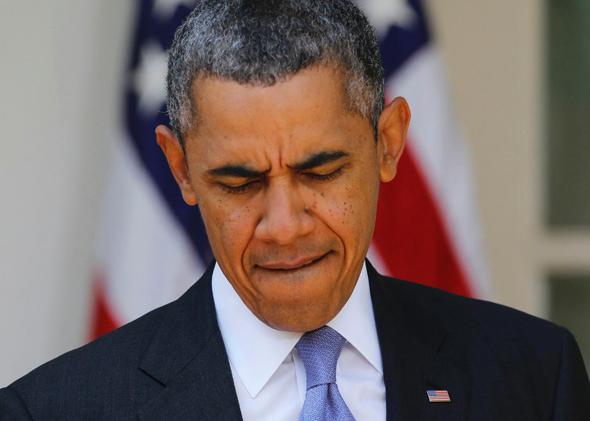We know how Tom Clancy’s president would deal with the danger of breaching the debt limit. He would do a barrel role on the White House lawn, pull his gun from his holster, and shoot it right between the eyes. That would be only slightly less dramatic than New Jersey Gov. Chris Christie’s solution: “My approach would be, as the executive, is to call in the leaders of the Congress, the legislature, whatever you’re dealing with and say that we’re not leaving this room until we fix this problem. Because I’m the boss, I’m in charge.”
The action-hero image of the presidency is alive and well. That may cause President Obama a headache as voters look to him for bold leadership to avoid the economic collapse created by the debt ceiling crisis, even if they hold him blameless for causing the problem in the first place. If Congress doesn’t get its act together in time, several presidential action-hero moves have been suggested to avoid the economic calamity.
“The president has inherent emergency powers,” University Chicago law professor and Slate contributor Eric Posner told the New York Times on Friday. “It has long been understood that the president should act to protect the country.” Posner has made this argument several times. Garrett Epps has been arguing since the near default in 2011 that the president has authority under Section 4 of the 14th Amendment, which says, “The validity of the public debt of the United States … shall not be questioned.” Asks Epps: “Wouldn’t it be better to save the nation from default by invoking the Fourteenth Amendment, than to stand by and do nothing?”
Those promoting this theory have gotten very specific about how the president will pull this off. (Epps has even taken the time to prewrite the speech Obama could give.) The president would just direct the Treasury Department to keep selling bonds. Obama would explain that the Republicans have left him no choice. The Constitution requires him to see that the laws are faithfully executed, but if he executes the debt ceiling law, he will be failing to execute the scores of laws that Congress has passed and that create the need for new borrowing. Put in this position, Henry Aaron argued this week, the president should follow the least bad option and break the ceiling.
One possible impediment to this plan would be that the White House legal counsel has said the president doesn’t have this authority under the Constitution. Sure, but the president can just get another opinion or claim the situation demanded it. He’s done that kind of back bend on matters of national security. He granted a waiver to businesses for the Affordable Care Act. A president can always find a workaround.
But the White House says finding a narrow legal rationale for this break-glass emergency measure would do no good because it would offer no certainty to financial markets—and staving off global economic chaos is what this whole exercise is about. “We’d break the glass, but it would only keep the house on fire,” says a senior White House aide. The gambit would be up for dispute in the courts and invite chaos in Congress. While the president may be willing to take a political hit for doing something edgy to save the economy, his treasury secretary and economic advisers worry most about the disruption the ensuing legal fights would cause. At the very least people buying U.S. treasuries would want a serious risk premium for buying securities whose value was being debated in court. As a White House official put it, “We’re talking about full faith and credit of the United States, and that faith is undermined if there is a dispute.” Maybe, but wouldn’t they do this in the end if chaos were near? “No, because it wouldn’t avoid the chaos.”
Let’s assume for a moment that this whole theory about the market is a bluff. As a negotiating matter, the president and his aides don’t want to admit there’s anything the president can do because they’re framing this political deadlock as a congressional problem. To even entertain the idea that he could perform some 11th-hour heroics would let Congress off the hook. So the president would be crazy to ever look like he is embracing the idea in the slightest. But given the way the discussion over the debt limit is going, the president should still probably have the speech ready in his back pocket.
